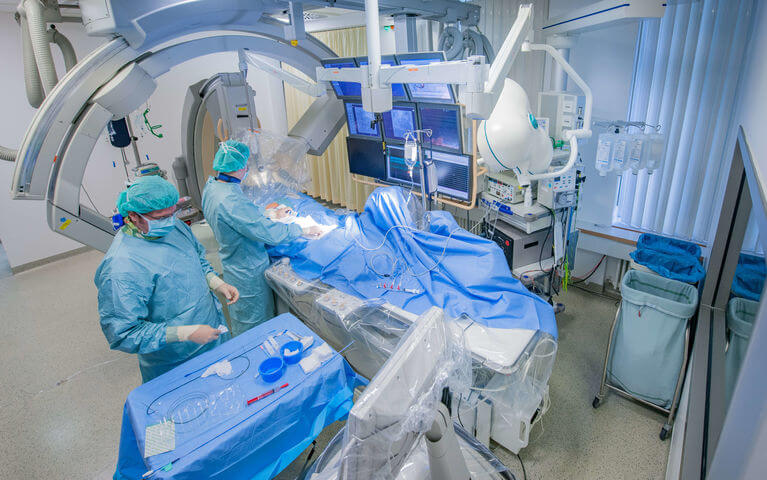Department of Cardiology, Angiology and Pneumology
at Heidelberg University Hospital
The Department of Cardiology, Angiology, and Pneumology at Heidelberg University Hospital is one of the leading university cardiology departments in Germany, meaning our team has a great deal of experience in the most common examination methods and in the sophisticated treatment of various cardiovascular diseases. Through our research activity, we are continually working to further improve the diagnostic and therapeutic options we offer. There are a number of innovative methods we have at our disposal that are only available at a few hospitals.
Every year, we treat about 12,500 inpatients with cardiovascular diseases, perform more than 9,000 heart catheter examinations and treatments, and implant 600 pacemakers and defibrillators. Our 30 examination and procedure rooms are equipped with the latest technical equipment. On the wards, our patients are accommodated in pleasant two-bed rooms with an adjoining bathroom.
We conduct both the “major” heart catheterization examination, also called coronary angiography, via an artery as well as the “minor” heart catheterization examination via a vein. Access is generally via the groin, but in some examinations the catheter can be threaded through an artery in the hand.
Our diagnostic and therapeutic procedures include:
- State-of-the-art cardiac imaging
- Echocardiography incl. transesophageal 3D echocardiography as well as dynamic and pharmacologic stress echocardiography
- Computed tomography of the heart and of the coronary arteries (coronary CT)
- Magnetic resonance imaging of the heart (cardio-MRI)
- Invasive coronary diagnostic tests and therapy
- Coronary angiography incl. intravascular ultrasound (IVUS) and measurement of the fractional flow reserve (FFR measurement)
- Percutaneous transluminal coronary angioplasty (PTCA, widening of the artery by means of a balloon catheter) with stent implantations, rotational atherectomy (drilling or abrading calcified plaque and constrictions of the coronary arteries
- Invasive diagnostic tests and therapy of peripheral artery occlusive disease
- Angiologic interventions in the peripheral, pelvic and leg arteries, renal arteries and the carotid artery (angioplasty with stent placements or a widening of the blood vessel using a balloon catheter
- Interventions with chronic venous occlusions as well as the treatment of varicose veins: Treatment of the veins in the upper and lower extremities as well as in the pelvis and the inferior vena cava through the application of innovative therapies (pharmacomechanical therapy, angioplasty, stent implants, minimally invasive, gentle sclerosis of epifascial varicose veins)
- Differential diagnostic tests and treatment of cardiac arrhythmias:
- Ablation of all cardiac arrhythmias, e.g., atrial fibrillation, atrial flutter, WPW syndrome, atrial and ventricular tachycardia using state-of-the art methods, e.g., robotically assisted pulmonary vein isolation (PVI) ablation, cryo-pulmonary vein isolation ablation (cryo-PVI), 3D-mapping guided ablation of atrial or ventricular tachycardias (CARTO, EnSite NavX)
- Implantation of event recorders to clarify disorders of consciousness
- Placement of pacemakers or implantable cardioverter defibrillators incl. cardiac resynchronization therapy (CRT)
- Minimally invasive therapy of heart valve diseases
- Heart valve reconstruction with balloon valvuplasty
- Implantation of aortic valves via cardiac cathetherization (transaortal, transfemoral)
- Repair of the mitral valve with cardiac catheterization (“Mitra-Clip”)
- Interventional therapy with heart defects and other complex cardiovascular diseases
- Closure of septal defects or of a patent foramen ovale
- Closure of the atrial auricle in patients with atrial fibrillation and contraindications to treatment using Marcumar or other anticoagulants
- Transcoronary alcohl septal ablation (TASH) for hypertrophic obstructive cardiomyopathy (HOCM)
- Renal denervation for refractory arterial Hypertension
- Diagnostic and therapy of Cardiomyopathies
- State-of-the-art therapies (alcohol septal ablation, MitraClip, assist devices, myectomy
- Electrophysiological 3D mapping and ablation of arrhythmias
- Genetic testing by Next-Generation Sequencing
- Family counseling
- Treatment of advanced heart failure
In our Advanced Heart Failure Unit with the latest therapies to support heart function through to heart transplants and in cooperation with the department of cardiac surgery: Permanent mechanical circulatory support (MCS) with left or biventricular assist devices (LVAD or BVAD)
Robotically assisted arrythmia treatment
A special feature of Heidelberg University Hospital – we routinely treat certain arrhythmias with a robotically-assisted system (Sensei(™) from Hansen Medical, USA). In this computer-assisted and thus very precise procedure, the physician guides the catheter into the heart from a console and ablates the source of the heart rhythm disorder using a high frequency current (catheter ablation). This method not only increases the precision of the procedure, but also reduces the patient’s exposure to radiation.
Our patients receive treatment that is in accordance with the guidelines and recommendations of German and international professional societies and expert commissions.
-

We wish you a pleasant stay and a quick recovery!



